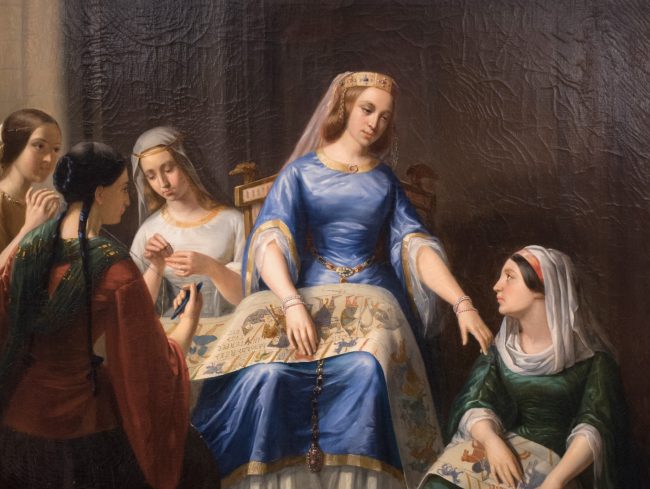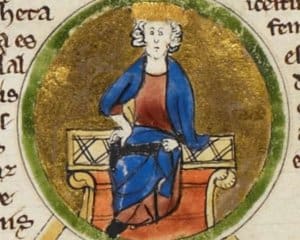 God Save the Queen!
God Save the Queen!
While technically no woman ruled over the English until the ascent of Mary I in 1553, two claim the title in the Middle Ages, this being Judith of France, who really seems to have held the title more symbolically and on account of her husband, Aethelwulf and later his son Aethelbald, and only for a short period on both occasions. Then there was Aelfthryrh, who was anointed as queen but does not seem to have held any real power, married to Edgar. For my money though, although not actually recognised as an actual queen (none of the women before the twelfth century were, indeed as we say above, no female actually sat the throne alone until Mary I) the one who makes the best case is Emma of Normandy.
Not only did she become Queen of England through her marriage to Aethelred the Unready, she later retook the title on her marriage to Cnut the Great, but as his consort also was named Queen of Denmark and Queen of Norway. She was the first, so far as I can see, to actually engage in political machinations, making alliances and moving pieces on the board, and at some points can be considered almost the
de facto ruler of England. Here’s her story.

Also known as Aelfgifu she was, you’ll no doubt be completely unsurprised to hear, French, a Norman noblewoman who was married to Aethelred in 1002 to both heal the rift between him and Richard II, Duke of Normandy, and save England from Viking attacks, most of which were by now being launched from there. On marrying Aethelred she was crowned Queen of England, though at the time it seems this was more just a formality, that her title was empty, depended entirely on her husband the king, and had no power attached to it. She did, however, receive land in Winchester, Devonshire, Rutland, Oxfordshire, Suffolk and Exeter. She had two sons by Aethelred: Edward the Confessor, who would go on to be one of the last kings of the House of Wessex, and Aelfred Atheling, who, well, wouldn’t.
When Aethelred died in 1016, his heir was not any of Emma’s sons but one from his previous marriage, Aethelstan. Angry at this snub to her sons, Emma began to try to gain support for her eldest son, Edward (later the Confessor) to be named successor, but even though the wily Eadric Streona - of whom more shortly - gave his support to her claim, she was overruled and Aethelstan was chosen. Nevertheless, she held London on the death of Aethelstan before marrying the victorious Cnut, and again being proclaimed Queen of England. Cnut, however, had no intention of allowing her sons, the sons of Aethelred, to aspire to the throne and so they were sent away to Normandy on her marriage. Emma later gave Cnut a son, Harthacnut, who became his heir.
In 1036 the two lads returned to England, ostensibly to pay a visit to mum, but in reality probably to try to take the throne. Alfred was captured by Godwin and delivered over to Harold’s men, who blinded him, wounds from which he quickly died later, while Edward, having had some success, returned to Normandy until it was safe to set foot on English soil again. When he did, and it was, he ruled jointly with Harthacnut, and as they were both sons of Cnut, Emma became the link between the two kings. In some ways, and to some historians and scholars, she is considered to have been all but a co-ruler of England. She even has part of an important eleventh-century work dedicated to her, the
Encomium of Queen Emma, which no other woman from this time does.
There is a legend - almost certainly untrue or at least embellished in her favour - which speaks of her being accused of infidelity, and having to undergo one of the ordeals of fire spoken of much earlier in this chapter. According to the account she walked across hot ploughshares and “felt neither the naked iron nor the fire”, and so proved herself innocent. Right. Now, about that asteroid shaped like a dancing moose…
Nevertheless, though she never officially ruled in her own name, given a) her marriage to two of the most powerful kings of the time, b) the fact that two of her sons then went on to be kings in their own right, c) her “stewardship” of London and later much of England and d) her machinations at court, particularly with Godwin, I think there’s a pretty good case for seeing Emma of Normandy as the first, shall we say, unofficial Queen of England.